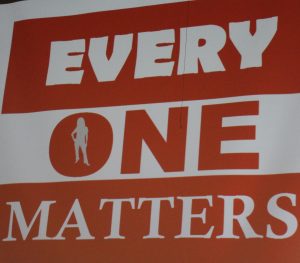GCS Opening Day Message
Today marked the official start of the 2017-18 school year for Goshen Community Schools. Teachers and staff members were welcomed by administrators, GEA members, and GCS Human Resources staff.
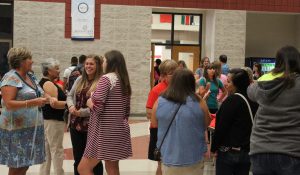
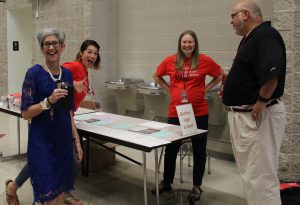
After a breakfast in the newly updated GHS cafeteria/kitchen, teachers had the opportunity to hear from staff and outside vendors about things such as retirement accounts, student loan solutions, the GCS health and other insurance benefits, computer systems in use at GCS, and Indiana Public Retirement Services.
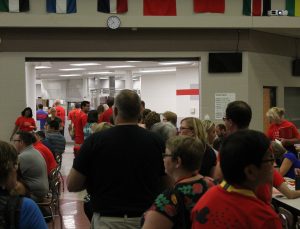
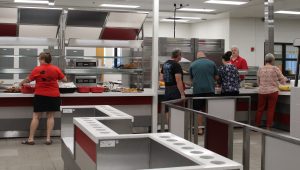
At 10:30 a.m., everyone gathered in the GHS auditorium. Dr. Woodworth welcomed returning staff members back to school, and gave an official welcome to those who were new to GCS. She introduced board members in attendance, Jane DeVoe, Keith Goodman, and José Elizalde, and also two new administrators, Steve Hope, Assistant Superintendent for Secondary Education, and Greg Beachey, Food Service Director.
Dr. Woodworth then introduced Bill Reith from United Way of Elkhart County. Mr. Reith presented plaques to each of the schools for the work they do as educators, and for partnering with United Way to improve the lives of people in Goshen.
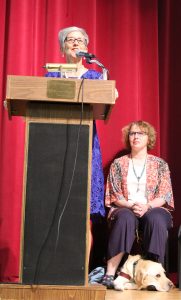
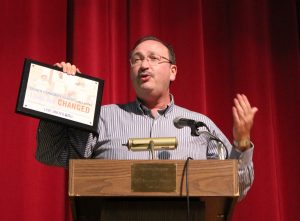
Next Dr. Woodworth introduced the featured guest speaker, Kathy Nimmer. Ms. Nimmer is an English teacher at William Henry Harrison High School in West Lafayette, IN. She was named the 2015 Indiana Teacher of the Year, and was also a finalist for the National Teacher of the Year.
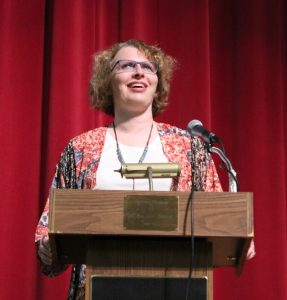
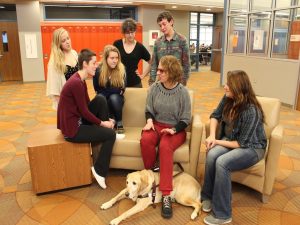 (Pictured here, in her school.)
(Pictured here, in her school.)
Ms. Nimmer asked the staff “What would it look like if you took a pledge of allegiance for the school year ahead, to your school?” She said that there would be some questions to ask, and she named those questions:
Who? She stated that the “who” was reflected by everyone in attendance, and she asked them to consider “Who has touched your life? Who influenced you?” Ms. Nimmer shared her story, about learning in elementary school that she had a degenerative disease which would cause her to lose her sight. She shared that upon returning to her school after learning of her diagnosis, her teacher sat her down and helped her to catch up on her school work. “I knew then that learning would always save me. No matter what, I could always learn. And from that moment on, I knew I wanted to be a teacher.” She noted that “whoever inspired you to be here has given you something, and that something is what your students need from you.”
What? What, exactly, are we pledging? “We are pledging to bring the best of ourselves.” She added that each of us has a different best, but that “there is a bounty of gifts sitting here today in all of you, available for your students”. She encouraged everyone to “be a person who takes the risk, who does more than what the teacher’s contract says is necessary”.
When? “When should we bring our best? When we feel like it? When we’ve had a good night’s sleep?” She stated we should bring our best every single day. Every. Single. Day. “If a student needs you on a day that you are just not feeling it, you might miss an opportunity, an opportunity that could change a life.”
Where? “Where is this school pledge binding? Is it just in the classroom, or the hallway too? How about the teacher’s lounge?” She said that it is in the classroom, “and beyond”. She noted that it could be a conversation in the hallway, at an athletic event, or even in a Walmart that might make a difference with a student. So, we have to understand that any place we are as educators might be THE place for a student who needs us.
Why? This, she said, has nothing to do with the administrators, your school board, or your superintendent. The “why” is “because your students deserve it” and “students will need you in ways you cannot imagine”.
How? Ms. Nimmer said that this question was not as easy to explain. “How can we be expected to make this pledge and keep this pledge, when we have overcrowded classrooms, poverty, students from broken homes, etc.?” It may not be easy, “but we have to do it, no matter what. No matter what!”
At that point, Ms. Nimmer asked the staff to stand, put their right hands over their “caring hearts”, and take a pledge for the school year, “because your students are waiting for you.” According to her instructions, the staff read the following pledge three times, with growing enthusiasm and conviction.
Pledge of Allegiance for the school year ahead:
I pledge to bring the best of me every single day to the classroom and beyond, because our students deserve it…no matter what.
Our deepest thanks to Kathy Nimmer for an inspirational start to our school year! We will not soon forget the stories, examples of students and teachers, and the wise words that will inspire our hearts on long days.
Dr. Woodworth had also prepared something for the staff, but stated that she mostly wanted to leave the staff with Ms. Nimmer’s words and the theme for GCS this year (which was chosen before we knew what Ms. Nimmer’s message would be) Every One Matters.
Dr. Woodworth ended the meeting with one illustration:
How are the Children?
Among the most accomplished and fabled tribes of Africa, no tribe was considered to have warriors more fearsome or more intelligent than the mighty Masai. It is perhaps surprising, then, to learn the traditional greeting that passed between Masai warriors: “Kasserian Ingera,” one would always say to another. It means, “And how are the children?”
It is still the traditional greeting among the Masai, acknowledging the high value that the Masai always place on their children’s well-being. Even warriors with no children of their own would always give the traditional answer, “All the children are well.” Meaning, of course, that peace and safety prevail, that the priorities of protecting the young, the powerless, are in place. That Masai society has not forgotten its reason for being, its proper functions and responsibilities. “All the children are well” means that life is good. It means that the daily struggles for existence do not preclude proper caring for their young.
I wonder how it might affect our consciousness of our own children’s welfare if in our culture we took to greeting each other with this daily question: “And how are the children?” I wonder if we heard that question and passed it along to each other a dozen times a day, if it would begin to make a difference in the reality of how children are thought of or cared about in our own country.
I wonder if every adult among us, parent and non-parent alike, felt an equal weight for the daily care and protection of all the children in our community, in our town, in our state, in our country… I wonder if we could truly say without any hesitation, “The children are well, yes, all the children are well.”
What would it be like… if the minister began every worship service by answering the question, “And how are the children?” If every town leader had to answer the question at the beginning of every meeting: “And how are the children? Are they all well?” Wouldn’t it be interesting to hear their answers? What would it be like? I wonder…
These are the words and thoughts running through the minds of GCS staff members as they prepare for students. May we all continue to ask each other “And how are the children?”
#everyonematters
